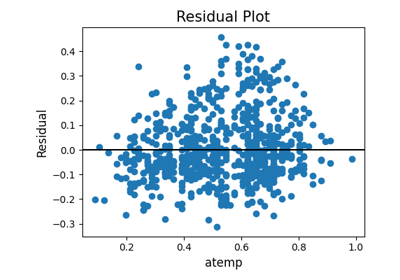piml.models.XGB2Regressor¶
- class piml.models.XGB2Regressor(n_estimators=100, eta=0.3, max_depth=2, tree_method='auto', max_bin=256, reg_lambda=0, reg_alpha=0, gamma=0, feature_names=None, feature_types=None, mono_increasing_list=(), mono_decreasing_list=(), random_state=0)¶
Depth-2 XGBoostRegressor.
- Parameters:
- n_estimatorsint, default=100
Number of gradient boosted trees.
- etafloat, default=0.3
Boosting learning rate.
- max_depth: int, default=2
Max tree depth
- tree_method{“exact”, “hist”, “approx”, “gpu_hist”, “auto”}, default=”auto”
Specify which tree method to use.
- max_binint, default=20
If using histogram-based algorithm, maximum number of bins per feature.
- reg_alphafloat, default=0
L1 regularization term on weights.
- reg_lambdafloat, default=0
L2 regularization term on weights.
- gammafloat, default=0
Minimum loss reduction required to make a further partition on a leaf node of the tree.
- feature_nameslist or None, default=None
The list of feature names.
- feature_typeslist or None, default=None
The list of feature types. Available types include “numerical” and “categorical”.
- mono_increasing_listtuple of str, default=()
The feature name tuple subject to monotonic increasing constraint.
- mono_decreasing_listtuple of str, default=()
The feature name tuple subject to monotonic decreasing constraint.
- random_stateint, default=0
The random seed.
- Attributes:
- n_features_in_int
The number of input features.
- is_fitted_bool
Indicator of whether the model is fitted.
- feature_names_list of str
The feature name list of all input features.
- feature_types_list of str
The feature type list of all input features.
- xgb_params_dict
The parameter dict of XGB model.
Methods
fit(X, y[, sample_weight])Fit the model.
Get metadata routing of this object.
get_params([deep])Get parameters for this estimator.
Interpret the model using functional ANOVA.
partial_dependence(fidx, X)Partial dependence of given effect index.
predict(X)Returns numpy array of predicted class.
score(X, y[, sample_weight])Return the coefficient of determination of the prediction.
set_params(**params)Set the parameters of this estimator.
set_score_request(*[, sample_weight])Request metadata passed to the
scoremethod.- fit(X, y, sample_weight=None)¶
Fit the model.
- Parameters:
- Xnp.ndarray of shape (n_samples, n_features)
Data features.
- ynp.ndarray of shape (n_samples, )
Target response.
- sample_weightnp.ndarray of shape (n_samples, )
Sample weight.
- Returns:
- selfobject
Fitted Estimator.
- get_metadata_routing()¶
Get metadata routing of this object.
Please check User Guide on how the routing mechanism works.
- Returns:
- routingMetadataRequest
A
MetadataRequestencapsulating routing information.
- get_params(deep=True)¶
Get parameters for this estimator.
- Parameters:
- deepbool, default=True
If True, will return the parameters for this estimator and contained subobjects that are estimators.
- Returns:
- paramsdict
Parameter names mapped to their values.
- parse_model()¶
Interpret the model using functional ANOVA.
- Returns:
- An instance of FANOVAInterpreter
The interpretation results.
- partial_dependence(fidx, X)¶
Partial dependence of given effect index.
- Parameters:
- fidxtuple of int
The main effect or pairwise interaction feature index.
- Xnp.ndarray of shape (n_samples, n_features)
Data features.
- Returns:
- prednp.ndarray of shape (n_samples, )
numpy array of predicted class values.
- predict(X)¶
Returns numpy array of predicted class.
- Parameters:
- Xnp.ndarray of shape (n_samples, n_features)
Data features
- Returns:
- prednp.ndarray of shape (n_samples, )
numpy array of predicted class values.
- score(X, y, sample_weight=None)¶
Return the coefficient of determination of the prediction.
The coefficient of determination \(R^2\) is defined as \((1 - \frac{u}{v})\), where \(u\) is the residual sum of squares
((y_true - y_pred)** 2).sum()and \(v\) is the total sum of squares((y_true - y_true.mean()) ** 2).sum(). The best possible score is 1.0 and it can be negative (because the model can be arbitrarily worse). A constant model that always predicts the expected value ofy, disregarding the input features, would get a \(R^2\) score of 0.0.- Parameters:
- Xarray-like of shape (n_samples, n_features)
Test samples. For some estimators this may be a precomputed kernel matrix or a list of generic objects instead with shape
(n_samples, n_samples_fitted), wheren_samples_fittedis the number of samples used in the fitting for the estimator.- yarray-like of shape (n_samples,) or (n_samples, n_outputs)
True values for
X.- sample_weightarray-like of shape (n_samples,), default=None
Sample weights.
- Returns:
- scorefloat
\(R^2\) of
self.predict(X)w.r.t.y.
Notes
The \(R^2\) score used when calling
scoreon a regressor usesmultioutput='uniform_average'from version 0.23 to keep consistent with default value ofr2_score. This influences thescoremethod of all the multioutput regressors (except forMultiOutputRegressor).
- set_params(**params)¶
Set the parameters of this estimator.
The method works on simple estimators as well as on nested objects (such as
Pipeline). The latter have parameters of the form<component>__<parameter>so that it’s possible to update each component of a nested object.- Parameters:
- **paramsdict
Estimator parameters.
- Returns:
- selfestimator instance
Estimator instance.
- set_score_request(*, sample_weight: Union[bool, None, str] = '$UNCHANGED$') XGB2Regressor¶
Request metadata passed to the
scoremethod.Note that this method is only relevant if
enable_metadata_routing=True(seesklearn.set_config). Please see User Guide on how the routing mechanism works.The options for each parameter are:
True: metadata is requested, and passed toscoreif provided. The request is ignored if metadata is not provided.False: metadata is not requested and the meta-estimator will not pass it toscore.None: metadata is not requested, and the meta-estimator will raise an error if the user provides it.str: metadata should be passed to the meta-estimator with this given alias instead of the original name.
The default (
sklearn.utils.metadata_routing.UNCHANGED) retains the existing request. This allows you to change the request for some parameters and not others.New in version 1.3.
Note
This method is only relevant if this estimator is used as a sub-estimator of a meta-estimator, e.g. used inside a
Pipeline. Otherwise it has no effect.- Parameters:
- sample_weightstr, True, False, or None, default=sklearn.utils.metadata_routing.UNCHANGED
Metadata routing for
sample_weightparameter inscore.
- Returns:
- selfobject
The updated object.

